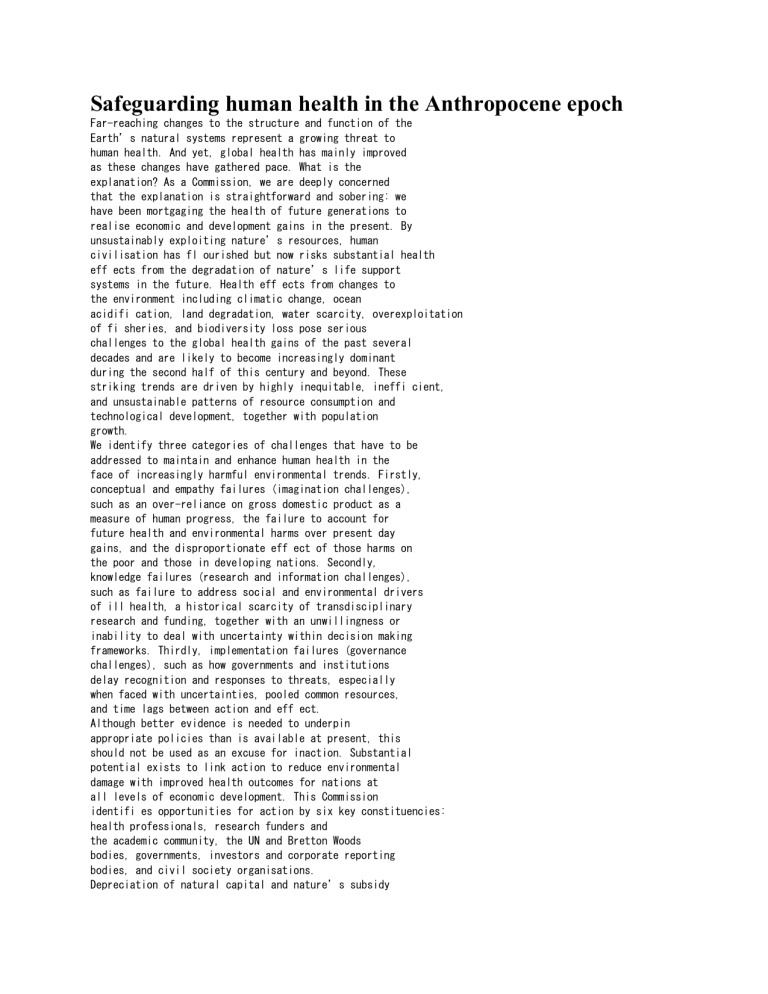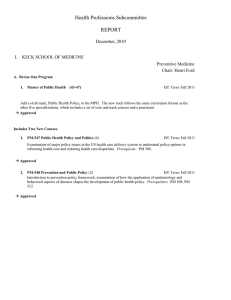Human Health in the Anthropocene: Challenges & Solutions
advertisement

Safeguarding human health in the Anthropocene epoch Far-reaching changes to the structure and function of the Earth’s natural systems represent a growing threat to human health. And yet, global health has mainly improved as these changes have gathered pace. What is the explanation? As a Commission, we are deeply concerned that the explanation is straightforward and sobering: we have been mortgaging the health of future generations to realise economic and development gains in the present. By unsustainably exploiting nature’s resources, human civilisation has fl ourished but now risks substantial health eff ects from the degradation of nature’s life support systems in the future. Health eff ects from changes to the environment including climatic change, ocean acidifi cation, land degradation, water scarcity, overexploitation of fi sheries, and biodiversity loss pose serious challenges to the global health gains of the past several decades and are likely to become increasingly dominant during the second half of this century and beyond. These striking trends are driven by highly inequitable, ineffi cient, and unsustainable patterns of resource consumption and technological development, together with population growth. We identify three categories of challenges that have to be addressed to maintain and enhance human health in the face of increasingly harmful environmental trends. Firstly, conceptual and empathy failures (imagination challenges), such as an over-reliance on gross domestic product as a measure of human progress, the failure to account for future health and environmental harms over present day gains, and the disproportionate eff ect of those harms on the poor and those in developing nations. Secondly, knowledge failures (research and information challenges), such as failure to address social and environmental drivers of ill health, a historical scarcity of transdisciplinary research and funding, together with an unwillingness or inability to deal with uncertainty within decision making frameworks. Thirdly, implementation failures (governance challenges), such as how governments and institutions delay recognition and responses to threats, especially when faced with uncertainties, pooled common resources, and time lags between action and eff ect. Although better evidence is needed to underpin appropriate policies than is available at present, this should not be used as an excuse for inaction. Substantial potential exists to link action to reduce environmental damage with improved health outcomes for nations at all levels of economic development. This Commission identifi es opportunities for action by six key constituencies: health professionals, research funders and the academic community, the UN and Bretton Woods bodies, governments, investors and corporate reporting bodies, and civil society organisations. Depreciation of natural capital and nature’s subsidy should be accounted for so that economy and nature are not falsely separated. Policies should balance social progress, environmental sustainability, and the economy. To support a world population of 9–10 billion people or more, resilient food and agricultural systems are needed to address both undernutrition and overnutrition, reduce waste, diversify diets, and minimise environmental damage. Meeting the need for modern family planning can improve health in the short term—eg, from reduced maternal mortality and reduced pressures on the environment and on infrastructure. Planetary health off ers an unprecedented opportunity for advocacy of global and national reforms of taxes and subsidies for many sectors of the economy, including energy, agriculture, water, fi sheries, and health. Regional trade treaties should act to further incorporate the

